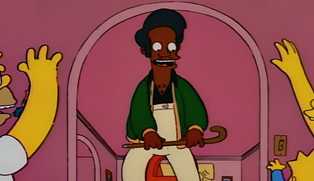“Mmm…Fried Chicken, fly vixen Give me heart disease but need you in my kitchen”
– Fried Chicken’ by Nas
For years, fried chicken shops have been the safe spaces for invisible communities, a haven of Halal, Muslim, Black, Brown, affordable, unhealthy food and everything in between. Growing up in London, there’s always been an informal ranking of which ones are best in both taste and value. We argue about whether the chicken burger at Chicken Cottage in Shepherd’s Bush was bang or that the wings in Simply Chicken in Euston were especially delicious. The language around chicken shops has often been tongue in cheek. Whether it was the rumour about Sam’s Chicken using pigeon meat, or mocking the bright lime green colour of the sofas in Dixy’s in Wood Green (who even thought it was a good idea to put sofas in a chicken shop in the first place).
The Pengest Munch emerged to explore some of these absurdities. The viral video series – a brainchild of Elijah Quashie of Tottenham (now the infamous Chicken Connoisseur) and creative collaborator Elishama Udorok of Hackney – reviews chicken shops up and down London. Elishama talked to me about his journey as an artist and the gentrification of chicken shops.
Cultural explorations of the chicken shops are almost as old as the internet, but none have reached the levels of virility The Pengest Munch has managed. The anthem, Junior Spesh, was one of the first music videos to signal the importance of the chicken shop. This was before Channel 4 aired The Fried Chicken Shop, at a time when YouTube was burgeoning. Affordability is the key message repeated throughout the song, interjected with the image of a South Asian bossman looking bemused:
junior spesh, yeah and it’s junior spesh
1 pound and 50 pence, 50 pence, 50 pence.
ain’t got money so be my guest,
but i got 1.50 so it’s bless
Affordability was and is the anthem. You just won’t find the same prices at KFC. And despite the Muslim community in the West’s reverence for the Fillet O’ Fish (for all its virtues and soft baby-bum bun), there is nothing like a chicken shop chicken burger. According to Elishama, affordability was one of the main reasons he and Elijah started the series. He takes me back to the very beginning, where his career in filmmaking was born out of a serendipitous access to resource.
 “Obviously I started free-running first, started parkour and back when I did it, YouTube was popping and I just found myself watching free-running videos from nowhere,” he tells me. “In Year 10, they used to have a thing in school where if you got bare merits, you got your name in the hat for a raffle and the winner of the raffle got a bike. One year, I won it. I was gassed. I asked Mr Cooch – shout out Mr Cooch he’s a badman – if instead of getting me bike, he would take the same money for the bike and get a camera, ‘cause I wanted to film myself doing jumps and be on YouTube like the free-running videos I watched.” The camera enabled him to work on his craft whilst studying Material Science and Engineering at Queen Mary University, as well as working a part time job as a runner at a production company. “I somehow I managed to live these different paths at the same time.”
For an artist of colour, the task of managing different paths becomes more difficult when charities dedicated to improving racial representation in the arts through funding and mentorship – like Creative Access, for example – have their funding cut. In December 2016 the government decided to halt funding to Creative Access to focus on funding apprenticeships. A week later, an Arts Council report stated that the “number of BME Art workers must improve.” Needless to say these cuts would do little to redress the imbalance.
Elishama explains that while the systemic and institutional barriers certainly got in his way and made his path to realising his vision that much harder, there were a few things that he found useful to remember. “If you got love around you and you are just trying to enjoy life, just follow what gasses you. Pursue those things. Keep that energy around you and it cannot flop. Get connected on that vibe. If you don’t meditate, meditate. If you don’t pray, pray.”
“Obviously I started free-running first, started parkour and back when I did it, YouTube was popping and I just found myself watching free-running videos from nowhere,” he tells me. “In Year 10, they used to have a thing in school where if you got bare merits, you got your name in the hat for a raffle and the winner of the raffle got a bike. One year, I won it. I was gassed. I asked Mr Cooch – shout out Mr Cooch he’s a badman – if instead of getting me bike, he would take the same money for the bike and get a camera, ‘cause I wanted to film myself doing jumps and be on YouTube like the free-running videos I watched.” The camera enabled him to work on his craft whilst studying Material Science and Engineering at Queen Mary University, as well as working a part time job as a runner at a production company. “I somehow I managed to live these different paths at the same time.”
For an artist of colour, the task of managing different paths becomes more difficult when charities dedicated to improving racial representation in the arts through funding and mentorship – like Creative Access, for example – have their funding cut. In December 2016 the government decided to halt funding to Creative Access to focus on funding apprenticeships. A week later, an Arts Council report stated that the “number of BME Art workers must improve.” Needless to say these cuts would do little to redress the imbalance.
Elishama explains that while the systemic and institutional barriers certainly got in his way and made his path to realising his vision that much harder, there were a few things that he found useful to remember. “If you got love around you and you are just trying to enjoy life, just follow what gasses you. Pursue those things. Keep that energy around you and it cannot flop. Get connected on that vibe. If you don’t meditate, meditate. If you don’t pray, pray.”
 As we discuss The Pengest Munch, Elishama and I are sat between an impressively large block of newly built flats. We are in Old Street, near the London borough of Islington, a short walk away from where Elishama grew up and currently lives. The shiny, metallic flats around us are for the class of professionals who are willing to pay the astronomical rents in order to live in a trendy, geographically convenient locale. Meanwhile the poorest are priced out by rising rents, and ‘affordable housing’ has become meaningless rhetoric.
It makes cultural phenomena like The Pengest Munch even more paradoxical, especially when the likes of Buzzfeed, The Independent, The Guardian and The Daily Mail have all fawned over the series. The same prospective residents of hyper-gentrified parts of London who in the past would either hurry by or sneer at the local PFC, now find the whole thing hilarious. The Evening Standard has even advertised a Fried Chicken Festival with prices starting at £20 to cater to the new and insatiable interest of middle class customers in fried chicken. Needless to say, you won’t find Dixy or Chicken Cottage setting up shop there.
As we discuss The Pengest Munch, Elishama and I are sat between an impressively large block of newly built flats. We are in Old Street, near the London borough of Islington, a short walk away from where Elishama grew up and currently lives. The shiny, metallic flats around us are for the class of professionals who are willing to pay the astronomical rents in order to live in a trendy, geographically convenient locale. Meanwhile the poorest are priced out by rising rents, and ‘affordable housing’ has become meaningless rhetoric.
It makes cultural phenomena like The Pengest Munch even more paradoxical, especially when the likes of Buzzfeed, The Independent, The Guardian and The Daily Mail have all fawned over the series. The same prospective residents of hyper-gentrified parts of London who in the past would either hurry by or sneer at the local PFC, now find the whole thing hilarious. The Evening Standard has even advertised a Fried Chicken Festival with prices starting at £20 to cater to the new and insatiable interest of middle class customers in fried chicken. Needless to say, you won’t find Dixy or Chicken Cottage setting up shop there.
 We don’t often think of the impact of viral culture on economics, nor do we usually see the affects of it so quickly. But since The Pengest Munch took off there have been noticeable price hikes in the better-rated chicken shops. Aside from that, there’s also a noticeable change in clientele. One popular tweet pointed out that chicken shops now resembled Vice articles.
“There’s 2 sides to it,” Lish tells me. “Elijah is kind of road. He doesn’t do road and he’s never done road and he’s never been trapping but he’s from the ends and so am I. [For Elijah], this is for the mandem to watch.” Unlike Junior Spesh before it, The Pengest Munch has spread out into audiences it was never initially intended for. The series has been embraced by the hundreds of thousands who may not have had the same cultural experiences growing up, of swapping the chips for 4 wings. The mandem are not the only ones watching now.
Whilst the chicken shop is in vogue at the moment, it represents an eyesore for developers looking to transform parts of London. It is unlikely that Labour councillor Clare Kobey leading Haringey’s £2 billion regeneration project wants to see more fried chicken shops in the borough. Chicken shops just aren’t sexy enough to sell to foreign investors. The question is: once the cultural phenomenon fades, will we see a Leon or Pret-a-Manger where there was once Eden’s Cottage in Finsbury Park? This is a question that’s been absent from coverage of The Pengest Munch phenomenon.
What the media narrative has focused on is the promotion of unhealthy food, something the series has taken a lot of flack for. The government and public figures have consistently discussed the need for healthier alternatives, from Jamie Oliver’s “Food Revolution” to the government’s childhood obesity strategy. London councils have even attempted to ban fried chicken and fast-food takeaways in a drive to combat obesity. While these policies may sound like a good idea, the reality is that they’re repeating information most people already know without addressing the larger economic problems that make healthy food unaffordable.
Lish explains, “You can say, yeah eat healthy. Or the alternative which Jamie Oliver pushes, that you cook your own food. That’s cool and stuff, if you got time to cook. But if you are a single mum, like my mum, and you got xyz amount of jobs, you’re really and truly gonna bang Iceland and dash that in the microwave or you’re gonna go get wings. What other alternatives are out there? I just think there could be more to do about that.”
The “why do poor people eat bad” shtick is about as liberal as CNN. The facts on the ground are that we live in a city where a single cupcake will sell for the same price as a whole fried chicken meal. For Lish, this is something he is keen to explore as someone who understands the stark differences in the eating habits of Londoners well. “I’m gassed by affordable food, especially when it is both good and affordable. That’s something I hope we’ll see more of soon.”
As for the cultural phenomenon that is The Pengest Munch, its consumption has revealed an unsurprising irony. The temporary media adoration has given chicken shops a second life, and has engendered a love for a much maligned establishment: the lo-fi London eatery usually run by immigrants. But once the dust settles and the Youtube views slow down, will chicken shops – along with the communities they serve – be able to withstand the viral spread of commercial developers?
We don’t often think of the impact of viral culture on economics, nor do we usually see the affects of it so quickly. But since The Pengest Munch took off there have been noticeable price hikes in the better-rated chicken shops. Aside from that, there’s also a noticeable change in clientele. One popular tweet pointed out that chicken shops now resembled Vice articles.
“There’s 2 sides to it,” Lish tells me. “Elijah is kind of road. He doesn’t do road and he’s never done road and he’s never been trapping but he’s from the ends and so am I. [For Elijah], this is for the mandem to watch.” Unlike Junior Spesh before it, The Pengest Munch has spread out into audiences it was never initially intended for. The series has been embraced by the hundreds of thousands who may not have had the same cultural experiences growing up, of swapping the chips for 4 wings. The mandem are not the only ones watching now.
Whilst the chicken shop is in vogue at the moment, it represents an eyesore for developers looking to transform parts of London. It is unlikely that Labour councillor Clare Kobey leading Haringey’s £2 billion regeneration project wants to see more fried chicken shops in the borough. Chicken shops just aren’t sexy enough to sell to foreign investors. The question is: once the cultural phenomenon fades, will we see a Leon or Pret-a-Manger where there was once Eden’s Cottage in Finsbury Park? This is a question that’s been absent from coverage of The Pengest Munch phenomenon.
What the media narrative has focused on is the promotion of unhealthy food, something the series has taken a lot of flack for. The government and public figures have consistently discussed the need for healthier alternatives, from Jamie Oliver’s “Food Revolution” to the government’s childhood obesity strategy. London councils have even attempted to ban fried chicken and fast-food takeaways in a drive to combat obesity. While these policies may sound like a good idea, the reality is that they’re repeating information most people already know without addressing the larger economic problems that make healthy food unaffordable.
Lish explains, “You can say, yeah eat healthy. Or the alternative which Jamie Oliver pushes, that you cook your own food. That’s cool and stuff, if you got time to cook. But if you are a single mum, like my mum, and you got xyz amount of jobs, you’re really and truly gonna bang Iceland and dash that in the microwave or you’re gonna go get wings. What other alternatives are out there? I just think there could be more to do about that.”
The “why do poor people eat bad” shtick is about as liberal as CNN. The facts on the ground are that we live in a city where a single cupcake will sell for the same price as a whole fried chicken meal. For Lish, this is something he is keen to explore as someone who understands the stark differences in the eating habits of Londoners well. “I’m gassed by affordable food, especially when it is both good and affordable. That’s something I hope we’ll see more of soon.”
As for the cultural phenomenon that is The Pengest Munch, its consumption has revealed an unsurprising irony. The temporary media adoration has given chicken shops a second life, and has engendered a love for a much maligned establishment: the lo-fi London eatery usually run by immigrants. But once the dust settles and the Youtube views slow down, will chicken shops – along with the communities they serve – be able to withstand the viral spread of commercial developers?




